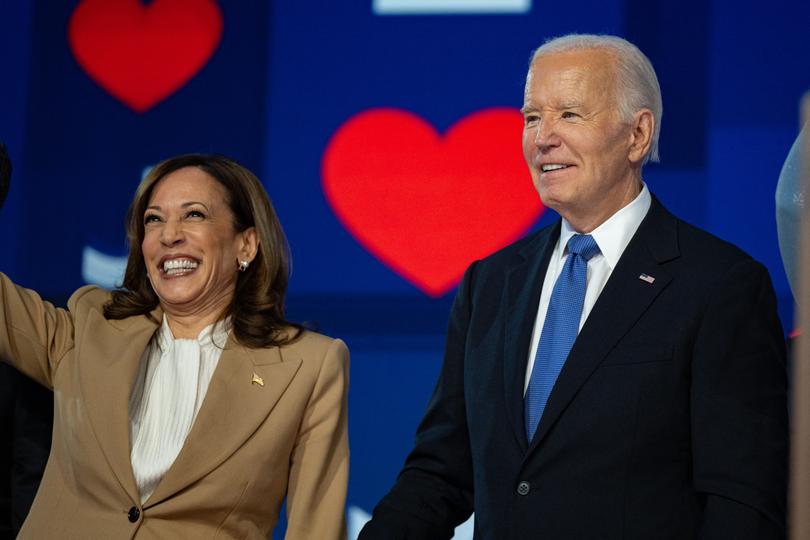Kamala Harris: Democrats release copy, paste Biden foreign policy
What will the Harris-Walz foreign policy agenda be and what will it mean for the Indo-Pacific? An embarrassing inclusion in the Democrats' platform shows they urgently need to fill in the blanks.
A common complaint of Donald Trump’s these days is that his new opponent Kamala Harris has still not done a single sit-down interview or faced an all-in press conference since displacing Joe Biden as the Democrat’s contestant for November’s US Presidential election.
He has a point. Harris has had an almost flawless start. Overnight she has injected hope, energy and momentum into the race and delivered the sheer mass of voters who wanted anyone but Biden or Trump a viable offering.
With her pick of the jovial football coach from Nebraska – Governor Tim Walz – the bouyount pair are hoping to overturn the politics of anger as they chart a happier way way forward for the United States.
Sign up to The Nightly's newsletters.
Get the first look at the digital newspaper, curated daily stories and breaking headlines delivered to your inbox.
By continuing you agree to our Terms and Privacy Policy.But the avoidance of any tough questions and instead opting for self-produced clips of her quizzing her running mate about tacos and musical taste is starting to look like a substitute, rather than complement to the questions that really need to be asked.
For her allies, top of this list is what will the Harris-Walz foreign policy agenda be? Will be it a continuination of the Bidenomics that fused economic security with industrial policy, pouring government subsidies into homegrown green and semiconductor manufacturing or something else?
And what will the commitment to the Indo-Pacific look like? More of the same, or something else?
On Monday, Harris could have tried to answer some of these questions when the Democrats released their platform.
But it embarrassingly appeared to be a copy and paste of whatever Biden was preparing to release, as it repeatedly references what President Biden would do in his second term.
Take for example the seven-paragraph section on the Indo-Pacific. It is the only time in the platform that Australia is mentioned and it is in reference to what President Biden achieved, note the past tense.
“Across the Indo-Pacific President Biden … elevated the Quad – which brings together the democratic strength of the United States, Australia, India and Japan,” the document states.
“He (Biden) founded AUKUS – a partnership among the United States, United Kingdom and Australia – to better integrate the defence industrial bases of two of our closest allies.”

Embarrassingly, the Indo-Pacific section ends with the declaration that “in his second term, President Biden will continue to promote a free, open, connected, prosperous, secure and resilient Indo-Pacific.”
Given there will be no second term for Biden, can it be assumed that Harris and Walz will carry Biden’s foreign policy forward?
Bryce Wakefield, CEO of the Australian Institute of International Affairs based in Canberra, says the most likely assessment is more of the same, and that’s not necessarily a good thing for our region.
“This reads as a general continuity of Biden’s foreign policy,” Mr Wakefield said.
“Which probably means some talk but insufficient commitment in the South Pacific and South-East Asia, regions that matter most to Australia.”
Additionally, in further trouble signs for AUKUS, the ambitious and eye-wateringly expensive plan for Australia to acquire and co-build nuclear-powered submarines alongside the United States and United Kingdom, will lose all three of its original authors once Biden exits the Presidential stage.
“Biden was personally invested in AUKUS. Harris will no doubt support it as it stands, but it is unclear if she would go to bat for it if it is seen to conflict with a domestic political agenda or America’s broader strategic goals.”
Peter Dean, Director of Foreign Policy and Defence at the United States Studies Centre at the University of Sydney, says Harris has left one of the biggest questions about her intentions unanswered.
“It’s one of the questions for her campaign — is she adopting Biden’s foreign policy agenda? Where does she differ? Will she articulate something new before the election?” Professor Dean said.
“She has crafted some space from Biden over Gaza but we have not seen much more from her campaign.
“That said, foreign policy doesn’t win elections and is not at the top of US voters’ minds.
“Her speech at the convention may give us some hints but she needs to build a broader policy platform post the Democratic National Convention.”
Harris has done well to rejuvenate the Democrats and put them in a viable position in just one month.
But with 75 days to go, she urgently needs to start filling in the blanks.

